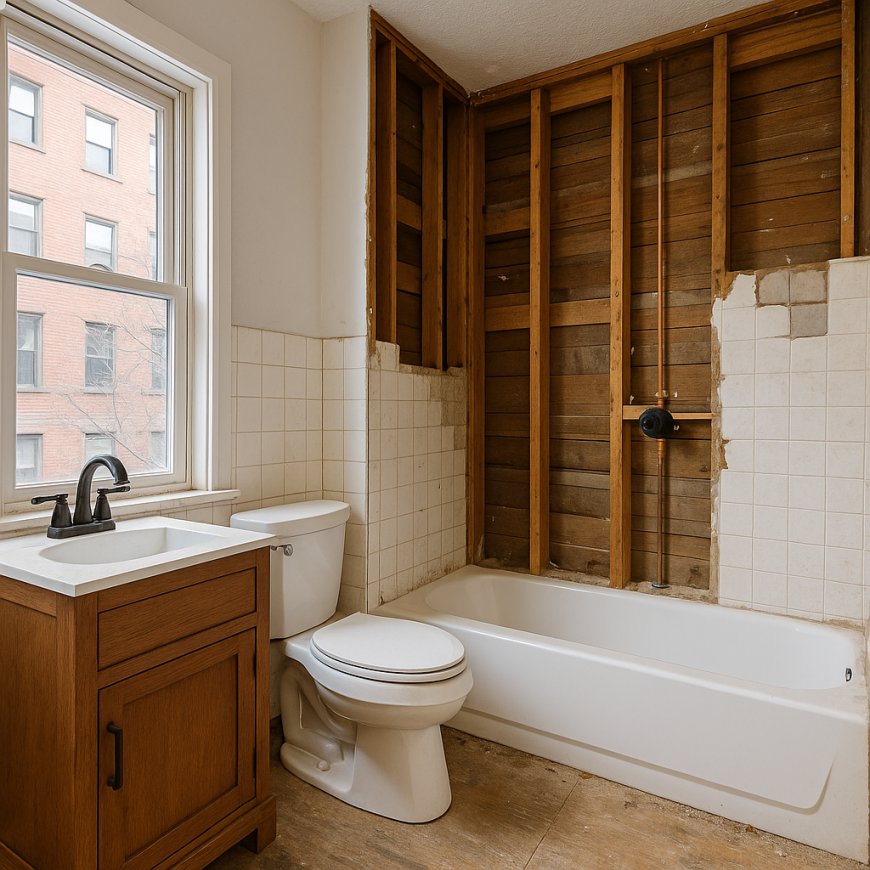What Brooklyn Contractors Don’t Tell You About Bathroom Renovations
Thinking of a bathroom renovation in Brooklyn, NY? Discover the untold truths contractors won’t mention—hidden costs, timeline delays, building issues, and more—in this eye-opening guide.

Introduction: The Truth Behind the Tile
So, you’ve decided it’s time. That cracked tub, leaky sink, and ancient tile have all got to go. You’re pumped, ready to dive into your bathroom renovation in Brooklyn, NY. You call a few contractors, gather quotes, and start imagining the end result—sleek fixtures, more space, maybe even heated floors. But here’s the thing: behind the clean promises and glossy portfolios, there’s a lot you’re not being told. Not because contractors are shady—many are hardworking pros—but because the full picture is rarely laid out for homeowners upfront. You usually find out the hard way, in the middle of the job, when timelines shift and costs grow faster than mold in a Brooklyn basement.
Let’s break it all down—the little secrets contractors tend to skip—and what you need to know before anyone touches a tile.
Timelines Are “Flexible”—And That’s Putting It Nicely
You’re told your bathroom renovation will take “two to three weeks.” Sounds great, right? Don’t bet your sanity on it. In Brooklyn, two weeks can easily stretch into five or six. Why? A lot of reasons. First off, old buildings = hidden problems. Behind those walls could be outdated plumbing, mystery wiring, or water damage you never saw coming. On top of that, contractors often juggle multiple jobs. Your project might get delayed because something else ran late. And then there's city permitting. Yep, even for bathrooms, some renovations need approvals. Waiting on paperwork from the Department of Buildings? That alone can put a freeze on your timeline.
Bottom line: Build in an extra 2–3 weeks into your expectations—minimum.
The Budget You Get Is Only Half the Story
You think you’re paying $15K? Add a cushion. Contractors rarely factor in everything. And again, it’s not always shady business—it’s just the nature of working in unpredictable Brooklyn homes. Let’s break it down with some real talk numbers:
| Item | Quoted Price | What You Might Actually Pay |
|---|---|---|
| Demolition & Cleanup | $1,200 | $1,600 (hidden damage adds time) |
| Fixtures (Sink, Toilet, etc.) | $2,500 | $3,200 (brand upgrades or stock issues) |
| Tile Installation | $2,000 | $2,800 (old floors may be uneven) |
| Plumbing/Electrical Work | $3,000 | $4,500 (outdated systems = surprises) |
| Labor | $4,000 | $5,000 (extra time = extra labor) |
If you go in expecting the number on the quote to be your final bill, you’ll be in for a shock. Always assume an extra 15–25% for those “oops, didn’t see that coming” moments.
Your Building Might Be the Real Roadblock
You’re ready. Your contractor’s ready. But guess who might not be? Your building. If you’re in a co-op or condo, there are rules—lots of them. Some require board approval before even lifting a hammer. Others have restrictions on when noisy work can be done (no weekends, only between 9-4, etc.). And don’t forget elevator reservations for moving supplies or debris.
Even if you live in a brownstone or townhouse, narrow staircases and tight hallways make transporting materials a slow (and pricey) process. Most contractors won’t mention this until you’ve already signed. But trust me—check with your building first, and factor in delays caused by logistics, not just construction.
“Standard” Materials Are Never as Standard as They Sound
Ever get shown a selection of tiles or faucets that look nice but feel kind of… basic? That’s because most quotes include “builder grade” materials. Think the most affordable, mass-produced options—fine on paper, underwhelming in person. Contractors offer these to keep base quotes low. But once you start picking out what you actually want—matte black fixtures, handmade tiles, a floating vanity—the costs can balloon fast.
Also, be ready for this phrase: “That’s backordered.” The most popular styles often take weeks to arrive. If you fall in love with something not in stock, be prepared to either wait or pivot.
“The style you fall in love with is always the one that costs more or takes longer—plan for it, and you’ll avoid renovation heartbreak.” — A Brooklyn Designer Friend Who’s Seen It All
Conclusion: Ask More, Plan Better, and Don’t Rush In
Doing a bathroom renovation in Brooklyn, NY is a great investment—not just for your property, but for your daily life. But it’s not a decision to make based on TV shows, fast quotes, or smooth-talking contractors. Behind every beautifully tiled wall is a story of delays, decisions, and a few dollars you didn’t expect to spend. And that’s okay—as long as you’re prepared. The contractors aren’t out to get you, but they won’t always tell you the full story unless you ask the right questions.
So before you jump in, ask about timelines, contingency costs, building policies, and materials. Get everything in writing. And most importantly, expect the unexpected. Renovation is a journey, not a weekend project. Go in with patience, a solid cushion in your budget, and a backup shower plan—and you’ll come out the other side with a space that’s not just new, but actually works for you.
What's Your Reaction?
 Like
0
Like
0
 Dislike
0
Dislike
0
 Love
0
Love
0
 Funny
0
Funny
0
 Angry
0
Angry
0
 Sad
0
Sad
0
 Wow
0
Wow
0





























